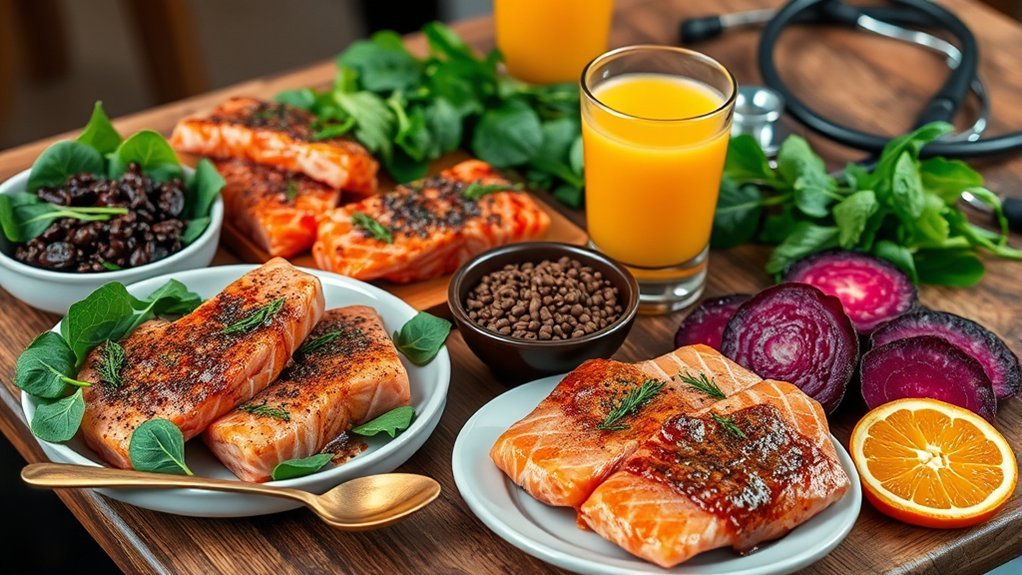Iron is essential for your health, yet many overlook its importance in their diet. If you’re feeling unusually fatigued or dizzy, it could signal a deficiency. Recognizing the signs and knowing when to consult a doctor can make a significant difference. You’ll want to explore the best sources of iron and understand how to enhance its absorption. Are you aware of the symptoms that should prompt a visit to your healthcare provider?
The Importance of Iron in Your Diet
Iron plays an essential role in maintaining your overall health, as it’s necessary for producing hemoglobin, the protein in red blood cells that carries oxygen throughout your body. Without sufficient iron, you risk developing iron deficiency anemia, which can lead to fatigue, weakness, and a compromised immune system. Your body relies on iron for energy production and enzyme function, impacting everything from metabolism to cognitive performance. It’s important to recognize that certain groups, like pregnant women and athletes, have higher iron needs. Regularly monitoring your iron levels through dietary intake or supplements can help prevent deficiencies. Incorporating iron-rich foods into your meals guarantees you meet your daily requirements, keeping you energized and healthy. Prioritizing iron is a proactive step toward maintaining your well-being.
Top Iron-Rich Foods to Include
To maintain ideal iron levels, it’s important to incorporate a variety of iron-rich foods into your diet. Start with lean meats like beef, pork, and poultry, which are excellent sources of heme iron, easily absorbed by your body. Seafood, especially oysters and clams, packs a powerful iron punch too. If you prefer plant-based options, consider lentils, beans, and chickpeas, which provide non-heme iron. Dark leafy greens like spinach and kale can also help boost your intake. Don’t forget fortified cereals and whole grains, as they often contain added iron. Pairing these foods with vitamin C-rich options, like citrus fruits or bell peppers, can enhance iron absorption, making your meals even more effective for maintaining healthy levels.
Symptoms of Iron Deficiency to Watch For
How can you tell if your body is lacking in iron? Watch for several key symptoms. Fatigue and weakness are common signs, as your body struggles to produce enough hemoglobin for oxygen transport. You might also experience pale skin or shortness of breath during everyday activities. Dizziness or lightheadedness can occur, especially when standing up quickly. Additionally, brittle nails and unusual cravings for non-food items, like dirt or ice, may signal low iron levels. If you notice these symptoms, it’s essential to evaluate your diet and consider incorporating more iron-rich foods. Remember, early detection can prevent more serious health issues, so stay vigilant about these warning signs.
When to Seek Medical Advice
If you notice persistent symptoms of iron deficiency, like fatigue or shortness of breath, it’s essential to seek medical advice. These symptoms can indicate a more serious underlying issue that requires professional assessment. Don’t ignore other signs such as pale skin, dizziness, or unusual cravings for non-food items, known as pica. If you’ve recently increased your iron intake but still feel unwell, it’s important to consult a healthcare provider. They can perform blood tests to determine your iron levels and assess your overall health. Remember, early intervention can prevent complications. Don’t hesitate to reach out if you have concerns—your health is worth prioritizing. Taking action now can lead to effective treatment and improved well-being.
Tips for Enhancing Iron Absorption
While incorporating iron-rich foods into your diet is essential, enhancing your body’s ability to absorb iron is equally important. To boost absorption, pair non-heme iron sources, like beans or spinach, with vitamin C-rich foods such as oranges or bell peppers. This combination can greatly increase iron uptake. Avoid consuming calcium-rich foods or supplements alongside your iron sources, as calcium competes for absorption. Additionally, limit coffee and tea during meals; their tannins can inhibit iron absorption. Cooking in cast iron cookware can also add a bit of iron to your meals. Finally, consider your overall diet; a balanced intake of nutrients supports ideal iron absorption, making it easier for your body to utilize the iron you consume.
Frequently Asked Questions
Can Iron Supplements Cause Side Effects?
Yes, iron supplements can cause side effects. You might experience nausea, constipation, or stomach discomfort. It is crucial to start with lower doses and consult your doctor if you encounter persistent issues or severe reactions.
How Does Cooking Affect Iron Levels in Food?
Cooking can enhance iron absorption in some foods, especially when using acidic ingredients like tomatoes. However, overcooking can reduce iron levels, so it’s best to use appropriate cooking methods to maintain nutrient content.
Are There Vegetarian Sources of Heme Iron?
You won’t find vegetarian sources of heme iron, as it’s primarily in animal products. However, you can boost your iron absorption by pairing non-heme iron foods, like legumes and leafy greens, with vitamin C-rich foods.
What Is the Difference Between Iron Deficiency and Anemia?
Iron deficiency means you lack enough iron for your body’s needs, while anemia occurs when your blood doesn’t have enough healthy red blood cells, often caused by iron deficiency. Both conditions require attention for proper treatment.
How Can I Test My Iron Levels at Home?
You can test your iron levels at home using a simple finger prick test kit. Think of it like checking your fuel gauge; it shows if you’ve got enough energy to keep going strong.
Conclusion
Incorporating iron-rich foods into your diet is essential for maintaining your health. Recognizing the symptoms of iron deficiency, such as fatigue and dizziness, can empower you to take action. If dietary changes don’t improve your condition, don’t hesitate to seek medical advice. Prioritizing your health, enhancing iron absorption, and consulting a doctor when needed will keep you feeling your best. Stay informed, stay proactive, and guarantee your iron levels support your overall well-being.
